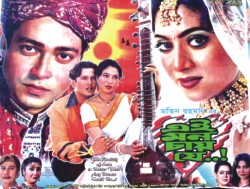| Perspective
The Gyrations of the Film Industry
Shireen Pasha
 The Agence France Presse recently carried an article entitled 'Bangladesh Government Loses Patience with Immoral Films'. The story talked at length about the Film Development Corporation's (FDC) disgust with the 100 or so low budget musicals that are made in Dhaka every year, void of plots, and filled with fights and dancing. Apparently, the FDC summoned 22 actors to reprimand them for gyrating their hips and showing their skin. The FDC, despite having approved these hundred films, and no others, says that it wants quality films with cinematic creativity, and even a story squeezed into more than just the last 10% of the footage. The FDC is not alone; so would the majority of people living in Bangladesh. The Agence France Presse recently carried an article entitled 'Bangladesh Government Loses Patience with Immoral Films'. The story talked at length about the Film Development Corporation's (FDC) disgust with the 100 or so low budget musicals that are made in Dhaka every year, void of plots, and filled with fights and dancing. Apparently, the FDC summoned 22 actors to reprimand them for gyrating their hips and showing their skin. The FDC, despite having approved these hundred films, and no others, says that it wants quality films with cinematic creativity, and even a story squeezed into more than just the last 10% of the footage. The FDC is not alone; so would the majority of people living in Bangladesh.
Part of the problem is the Film Development Corporation itself. What is it developing? When I think of the characters and stories that have travelled through the Brahmaputra-Ganges Delta, the adjective developing hardly ever comes to mind. The word vastness resonates in my ears as I imagine the jamdani weavers by the Shitalaukha river; Nazrul Islam running away with theatre troupes as a child; frogs, cobras, fireflies, swamps hopping with life; the Garos, the Chakmas, the Khasis; young Rabindranath on his boat listening to the songs of the boatmen; the large freedom that roamed in Lalon's heart without ever traversing continents. Why are we not telling these stories on celluloid? Why are we not telling multiple versions of these stories? Perhaps it is because the country is so focused upon describing itself as developing that it has forgotten to value its wealth.
The FDC is too much of a regulator, and not enough of an enabler. Instead of facilitating the success of emerging, experimental, and independent filmmakers, the FDC has gotten into the business of licensing production. They control access to production equipment by requiring producers and directors to take tests. Licensing provides an opportunity for ghush. Without a license, no film can be made, whether the filmmakers need help from FDC or not. Unfortunately, the issue is also tied up with the formal and informal financing of the industry, and control of the theaters.
How can we open opportunity, given that the FDC cannot have the resources to meet the demand of both filmmakers and the public, even if it had better policies? Here the interim government itself could make a big contribution by eliminating duties on film production equipment and materials; because the economic (not to mention cultural) benefits would far outweigh the loss in duties. Third, incentives should be provided for co-productions between producers and artists from SAARC member countries and indeed any other country that's interested. One result of this would be that Bangladesh would be able to export films, and share its cultural assets. (Currently, people in Bangladesh live on pirated imports, while the rest of the world is stuck on the drowning mother as the only image of Bangladesh.) Fourth, it could provide incentives for investment in theatre space, and in imagining theatre spaces in a variety of ways to accommodate a range of ticket prices.
If these recommendations and others like them are explored then dynamic filmmaking will take place around many places in Bangladesh Chittagong, Dhaka, Dinajpur, Feni, Sandip, Sylhet; and how much more wonderful would this be than the unitary Dhaliwood, which is just a flimsy fable of the FDC? These films would celebrate the beauty of the country's different languages and dialects as well as places and soundscapes. One of the refreshing things happening in cinema around the world is that as the technology becomes accessible, film production is becoming decentralised leading to a rich harvest of stories from unlikely characters, celebrating the local for the global audience. Rather than berating the actors themselves, the government needs policies to unleash people's creativity, and the FDC needs to be a facilitator and not a regulator.
Shireen Pasha is the director of What is time, my love? which will be shown on 20 July 2007 at ATA in San Francisco, and free on-line: www.timemylove.com
Copyright
(R) thedailystar.net 2007 |
|
